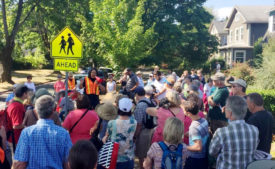For a long time I’ve been suggesting (as have scores of others) that environmentalists—or activists in general—aren’t necessarily their own best spokespeople; better to partner with doctors, local businesspeople, teachers, concerned parents, etc.
The problem? Environmentalism has been successfully cast as a fringe concern, not the basic, universal right of every man, woman, and child to have safe and healthy air, water, food, land, sea, and natural places—not to mention economies based on security and sustainability not corporate profit and destruction.
But before I get too openly indignant about all this, thus giving myself away as a card-carrying greenie (whoops—too late?), here’s more evidence that the environmentalist identity is not always compelling to those outside the choir.
A research team led by University of Toronto psychologist Nadia Bashir found, in several different studies of Americans, that participants held strongly negative stereotypes about environmentalists (and feminists too). The most frequently mentioned traits describing “typical environmentalists” included “tree-hugger” and “hippie.”
The researchers conclude that this caricaturing of activists actually hampers progress even among audiences who generally agree with their goals. As they describe it, the image problem plays “a key role in creating resistance to social change.”
Writing in the European Journal of Social Psychology, Bashir and her colleagues describe three pilot studies that found essentially the same things: 1) Americans described both environmentalists and feminists in “overwhelmingly negative” terms, consistently defaulting to negative stereotypes. 2) Actions considered “extreme” were a turn off; in particular, participants didn’t want to “hang out” with the types of activists who would stage protest rallies, but could see themselves being friends with those who use “nonabrasive and mainstream methods” such as raising money or organizing social events. 3) The messengers mattered: “Participants were less motivated to adopt pro-environmental behaviors when these behaviors were advocated by the ‘typical’ environmentalist, rather than by the ‘atypical’ environmentalist or the undefined target.”
So, unfortunately, being pegged as an environmentalist can weaken the broad appeal of your message. It’s a shame because majorities probably agree with your values.
It doesn’t mean we should all go into hiding. But even executive directors of environmental organizations can chip away at negative stereotypes by playing up other parts of their identity. Saying you’re motivated as a parent or grandparent, for example, can go a long way.
Plus, while I’m not aware of any research on this, my hunch is that it’s the unlikely activists, regular, everyday citizens who stand up for what they believe in, who are more likely to get attention (the good kind), to be respected rather than reviled, and to be cast as heroes by the media, even when they undertake stereotypical environmentalist actions like chaining themselves to fracking equipment. Think: Cindy Sheehan and Erin Brockovich and John Beal.
The Salon headline reads “Everyone Hates Environmentalists and Feminists.” But it’s not so dire. There are plenty of stereotype-defying messengers out there who care deeply and represent mainstream America. Plus, activists are people too—they just need to remind everyone that more often!











Nicho[las] Whittaker Dankers
Happy 20th-year Sightline!
As a former Northwest Environment Watch (NEW) Intern, I can chart my evolution from a long-haired “environmentalist” to a shorn-headed “Consulting/Climbing Arborist” by my educational experiences necessary to make “activism” work.
One touchstone moment occurred during the 1998 Northern Forest Stewardship Conference (in Vermont) when a local property rights group set up a protest on the nearby road. During a conversation, one of the men stated that “I don’t want these [college] kids who have never worked a day in their lives telling me how to live mine!”
It remains a fair point. 5th-year, “Super-Seniors” at Dartmouth advised me to “Dude, graduate with a trade” so that one could forever find employment from those who want to discuss Martin Buber’s I and Thou while you fix their sink.
Thus, my college career took a turn towards the experiential as I strove to “help restore the planet” through work that was meaningful, effective, and economically-sufficient. Being an unpaid intern at NEW during the following summer only reinforced the point and yadda yadda yadda I’ve been an International Society of Arboriculture (ISA) Certified Arborist and Qualified Tree Risk Assessor for roughly 10-years.
There are those among the arborist community who proudly embrace the “tree-hugger” nickname because we can easily talk chainsaws and felling techniques with any loggers who rarely get to climb trees any more. Now that I am at the UW School of Environmental and Forest Sciences (SEFS), it is clear that the emerging field of Restoration Forestry will require the collective know-how of both urban and rural foresters to help previously-cut landscapes return to resilient, old-growth systems. Green Collar Jobs are very much in demand while Buber’s Us-Them dynamic becomes a more reasonable WE.
Having been heckled as an “environmentalist” while carpentering on a construction site (even with a hair-cut), I will say that times have changed. Now, when my scope is to inspect a prominent tree that has been appraised for $15,000; the owners have been known to declare to all contractors that “if this [specimen] dies, someone gets fired!” All of a sudden, people read the Tree Protection Zone signs and call me even when they are thinking about going behind the fence. Adam Smith saves the day by sharing the tree’s value with all related parties and letting the free market sort out the rest.
During a recent Restoration Forestry field course with Professor Jerry Franklin (one of the godfathers of old-growth research), we met with a number of “Pan-stakeholder Catalysts” working with a wide spectrum of groups on a series of selective logging pilot projects. These leaders generally had backgrounds diverse enough talk about both Nascar and meditation with anyone interested in the success of using logging revenues from a site to fund its habitat improvements. The understandable surprise is that small-scale patch disturbances through logging and/or prescribed fire treatments are essential to provide the structural diversity in a forest stand for the trophic levels from microorganisms to spotted owls and [eventually] wolves. “Pan-Stakeholder Catalysts” can communicate this concept by firing up a chainsaw or transcendentally connecting with the Diversity of Life. If the US Forest Service starts requiring a certification for “Environmentalist-Loggers” to perform this type of work, I hope that the University of Toronto would conduct another research study.
I am a proud “Environmentalist” and reluctant slayer-of-trees, though I rarely find this label to be a limiting factor. With a wide array of clients, I have found that wind storms and cat rescues are great unifying factors across our society. Protecting someone’s family and property through careful tree maintenance can lead to an array of conversations about our purpose on This Place on Earth. However, if you rescue someone’s cat; all political, socioeconomic, and religious distinctions fade rapidly from a pleasant moment of creative unity. If I end up rescuing someone’s feline DURING a wind storm, then I will post another comment…
NWD
Fulvio Casali
I could not help but make a direct association with another article I read just this morning: On the Phenomenon of Bullshit Jobs, by David Graeber, published on Strike! Magazine (http://www.strikemag.org/bullshit-jobs/?utm_content=buffer3d429&utm_source=buffer&utm_medium=twitter&utm_campaign=Buffer)
Specifically, the part about how resentment gets whipped up against workers who, by going on strike, manage to inconvenience the rest of us, thereby proving that their work has some tangibly obvious social value, unlike most other jobs. Or how mainstream culture is quick to foster resentment against teachers or auto workers for their supposedly bloated wages and benefits. It’s as if they are being told “but you get to teach children! Or make cars! You get to have real jobs! And on top of that you have the nerve to also expect middle-class pensions and health care?”
My point is that the reason why “Everyone hates environmentalists and feminists” might be that those activists embody too harsh a reminder for everybody else of what their lives would look like if they had a purpose. Obviously, nobody likes that, and it’s good to be reminded that playing into that dynamic is counterproductive. And also, that it’s not personal: the activist’s side of that dynamic all too often verges on the martyr end of the spectrum, and some people feel a bit too comfortable in that role.
Phillip Johnson
Let me first say that I’m an Anna Fahey fan. It isn’t that I always agree with your take on things–indeed, I’m about to partially disagree. But you focus relentlessly on very practical, very challenging real-world questions about how to communicate effectively. It is always worth wrestling with the perspectives on communication about climate and other environmental concerns you provide, even if I might come down somewhat differently. You are providing a valuable service in pushing us to think about these problems.
I partially agree with the thrust of this column. Environmentalists should avoid playing into stereotypes. I’m a gray-haired grandfather, and I have enough sense to couch my statements about environmental issues in terms of my concern about the world my daughter and granddaughter will live in. I’m reasonably well-barbered and neatly dressed. I do my best to keep my tone temperate. (A member of the organization I direct just recently blurted to me, “The trouble with you is, you’re too fair,” which I took as a compliment.) I find excessive arm-waving exasperating.
However, I’ve been saying for 20 years or more that environmentalism has replaced homosexuality as “the love that dare not speak its name.” Those in Seattle and Portland may not realize it, but the practice by environmentalists of hiding behind stalking horses who aren’t “typical environmentalists” is well-established in the rural Northwest (and I presume everywhere else outside liberal enclaves). I’ve been arguing against this practice for at least that long. People with anti-environmental prejudices are unaware of how many people in their own communities have strong environmental concerns. If everyone who identified as an environmentalist would stand up and declare him- or herself–say it loud, I’m green and I’m proud!–I think people, especially people in rural areas, would be shocked to find how many of their neighbors and co-workers had strong conservation beliefs. A lot of the prejudice would go away, in the same way that anti-gay prejudice has crumbled as people realized that they were talking about their friends, co-workers and children. I fully understand the practical politics in finding spokespeople who aren’t identifiably environmentalist, but I think it can be a trap. I would instead urge that environmentalists come out of the closet, own the label, and stop being defensive.
Steve Erickson
Exactly right on! I’m on Whidbey Island and for 25 years have been vilified as “beyond the pale” because our org doesn’t limit itself to what is acceptable to developers. We use the law (generally quite successfully) and because we win most of the time have been permanently labeled as extreme and radical. This stereotyping has been made possible by liberals, yuppies, and new agers who were too timid to ever stand up to the labeling and bullying. Frequently, these people are our best friends when someone starts recreational bulldozing next door and they need our help, but then won’t be seen in public with us.
I’m convinced that the spokesperson could be an elderly grandmother and it would make absolutely no difference in perception. The incessant never-ending stereotyping of “dirty hippie radical tree hugger” would still be hung on top of anyone who is in the least ways effective. People see what they have been taught they should see. Its the “Emperor has no clothes,” only in reverse. In this case, we will always be seen to be wearing tree-hugger suits because tens of millions of dollars have been spent convincing people that that is what they are seeing.
Steve Erickson
First they ignore you, then they laugh at you, then they fight you, then you win.
Describing the stages of a winning strategy of nonviolent activism. There is no record of Gandhi saying this. A close variant of the quotation first appears in a 1918 US trade union address by Nicholas Klein:
And, my friends, in this story you have a history of this entire movement. First they ignore you. Then they ridicule you. And then they attack you and want to burn you. And then they build monuments to you. And that, is what is going to happen to the Amalgamated Clothing Workers of America.
Proceedings of the Third Biennial Convention of the Amalgamated Clothing Workers of America (1918), p. 53
http://en.wikiquote.org/wiki/Mahatma_Gandhi
On Whidbey, you don’t hear any criticism now-a-days of the dirty hippies who stood in front of the chain saws in 1977 at the Classic U ancient forest, now part of South Whidbey State Park.
Deb Rudnick
I have to say I find some of these conclusions to be pretty obvious. Anyone who has ever worked in customer service knows that you don’t win customers by being critical and negative. You win customers by being honest and positive. So it shouldn’t surprise us that people will be more accepting of a message that comes in a package that is easier to handle. And certainly, if you are trying to get people excited about an issue that’s not in their frame of reference or sphere of interest, its usually far more effective to do this with a hook- a story, an appeal to the personal, a way of connecting with them on something they are passionate about. We can look to the gazillions of books and articles written from the private sector and from pop psychology and I think they’ll pretty much all echo these refrains.
That being said, I hope no-one takes away from this research the idea that one should be apologetic or self-effacing as an environmentalist, or feminist. I am a proud card-carrying member of both these labels, and I have no problem fully owning and identifying with them. As with any movement- be it civil rights, gay rights, disability rights, women’s rights, ecological rights- we have no reason to be ashamed of what we passionately believe in and work to defend. I do not believe in “hiding” the very serious consequences we are heading for if we do not work immediately and with great passion towards fighting climate change, because it might not “seem nice” to talk about it. But I absolutely do agree that to only talk in terms of devastating impacts, of fires, floods, and apocalyptic scenarios, leads to both paralysis of the speaker and numbness of the audience. We have to simultaneously communicate the message and let people know that they are empowered to do something about it. I do believe this is why entities like Grist and Yes! do such a great job, because they communicate these very serious issues with both passion and positivity. And humor, without which all is lost.
Deb Rudnick
Sorry- and of course I should have included Sightline in my list of effective environmental media! Which also does a great job communicating passionately and honestly, and includes a lot of positive stories. Which is why I read you guys all the time!
Cliff Sanderlin
Deb’s comments are spot-on. Regardless of the topic–environment, affordable healthcare act or something else–it seems more effective to tell a story that is relevant to the listener by making it personal: “My grandchildren are really worried about global climate change and are thinking it’s not even worth going to college.” Or, “Our son has not had money to pay for a thorough medical checkup since he grew up and left home, and now he is showing signs of diabetes.”